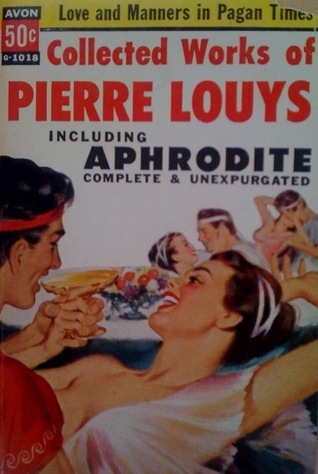What do you think?
Rate this book


448 pages, Paperback
First published January 1, 1932
"It is terrifying. It is the face of Medusa."
—Aphrodite, p.19
Once a month, at the full moon, they gathered in the close of the temple, maddened by aphrodisiac beverages and girdled by canonical phalli. The eldest of the thirty-six had to take a mortal dose of the terrible erotogenous philtre. The certainty of her speedy death made her attempt without fear all the dangerous excesses before which the living recoil. Her body, everywhere foaming, became the centre and the model of the whirling orgy; in the midst of long yells, cries, tears and dances, the other naked women clasped her, bathed their hair in her sweat, chafed themselves against her burning skin and excited new ardors in the uninterrupted spasm of this furious agony. Three years these women lived thus and, at the end of the thirty-sixth month, such was the intoxication of their end.And there's more...
—pp.51-52
The eldest had seemed pretty to him, but the youngest was without charm; and, as ugliness made him suffer, he avoided thinking of her.
—p.27
A woman one has not yet possessed has something virginal; but what good result, what surprise awaits a second meeting? It would be almost marriage.
—p.55
"There are but two ways of being unhappy: to desire what one has not or to possess what one desires. Love commences by the first and finishes by the second, in the most lamentable state—that is to say: as soon as it succeeds. May the gods save us from loving!"At least one of the Alexandrian courtesans at the party where Naucrates is speaking, by the way, is not yet 11 years old...
—Naucrates, p.89
"Believe me, what ruins these girls is the advice of women more than the eyes of men. I do not trust the best of them. Many a one with her rosary in her hand has the devil in her skirts."and
—Concha's mother, p.187
After what had happened there were only three things for me to do; leave her, force her or kill her.
I decided on the fourth one, which was to endure her.
—Mateo, p.204
LIV
The Past Which Survives
I will leave the bed as she has left it, unmade and rumpled, the covers tangled, so that the form of her body may remain impressed beside mine.
Until tomorrow, I will not go to the bath, I will not wear any garments, I will not comb my hair, for fear lest I efface her caresses.
This morning, I will not eat, nor this evening; and upon my lips I will place neither rouge nor powder, in order that her kiss may remain.
I will leave the shutters closed and I will not open the door, for fear lest the remembrance which she has left might fly out upon the wind.
—pp.261-262
I. Do no wrong to thy neighbor.This radical freedom, imposed by royal decree, leads to an amusing and fascinating mass of contradictions and contrasts—and cognitive dissonances—which, if nothing else, differ from the hypocrisies afflicting the rest of Europe at the time.
II. Observing this, do as thou pleasest.
—p.321
Heaven had spared him the concupiscences of the flesh and in an excess of compassion had spared them equally to all women that came in contact with him. {...} He was neither the victim nor the cause of sin.
—p.329
I have been told that the laws of our country permit a novelist to portray all the crimes of his characters, but not the least detail of their indulgences. Wholesale murder is a far lesser crime in the eyes of the legislator than pleasure.
—p.347
"I have five minutes," he said to himself. "Just time to make a sonnet."
—the page Giglio (also known as Giguelillot), p.418
The first contained:Wait, back up... knock-out drops?!? Sheesh. And that's not even asking what Giglio, or Louÿs, or translator Buck, thought the color of "flesh" was, or how it differed from "brunette."
A corkscrew.
Six corset laces.
Smelling salts.
Knock-out drops.
Three varieties of powder: white, flesh and brunette (in small boxes, pocket sizes).
Pins: white, black and round-headed.
{et cetera...}
—p.443
We need more dreams and more dreamers.with the very next sentence:
The soft voices of the nymphs would benefit and calm us infinitely more than the loud, shameless voices of the young females found between the covers of so many of our present-day books.
—translator Mitchell S. Buck, p.515
She no longer feared sinning as much as perhaps sinning awkwardly.
—p.723
...which one compares sometimes to those temples, two thousand years old, of which we have but the august fragments.
—Translator Claude Farrère, p.742